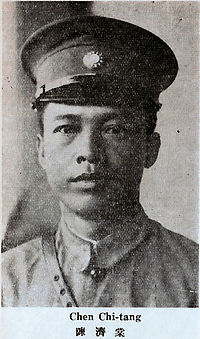- Chen Jitang
-
Chen Jitang
陳濟棠
Chen JitangBorn January 23, 1890 Died November 3, 1954 Allegiance  Republic of China
Republic of ChinaRank General (four stars) Chen Jitang (traditional Chinese: 陳濟棠; simplified Chinese: 陈济棠; pinyin: Chén Jìtáng) (January 23, 1890 - November 3, 1954), also spelled Chen Chi-tang, was born into a Hakka family in Fangcheng, Guangxi, China. He joined the Chinese Revolutionary Alliance in 1908 and began serving in the Guangdong Army in 1920, rising from battalion to brigade commander. He was designated commander of the 11th Division within the 4th Army in 1925 and took up the garrison of Qinzhou city, Guangxi, in 1926, thus staying in the south during the Northern Expedition. In 1928 he was made Commander of the 4th Route Army.
In addition to his military position, Chen also held governing authority over the Guangdong province. From 1929 to 1936, he made tremendous contributions to the province’s development, growth, and modernization. He paved the city streets and built high-rise commercial centers, numerous factories, and the first modern bridge across the Pearl River. He oversaw the establishment of a public school system with modern elementary and high schools and prestigious colleges and universities (including the Sun Yat-Sen University). People of the province fondly referred this period as the Golden Age of Guangdong and called him 南天王 (the Celestial King of the South).
Becoming chairman of the government of Guangdong in 1931, he turned against Chiang Kai-shek in the south after the arrest and release of Hu Hanmin and allied with New Guangxi Clique army commanders; another civil war might have broken out as a result if there had been no September 18 Incident in Shenyang, which reminded all sides of the necessity to unite. From 1931 to 1936 he was Commander in Chief 1st Army Group.
During Chiang Kai-shek's fifth campaign against Jiangxi Soviet, Chiang named Chen Jitang as the commander-in-chief of southern front, commanding over 300,000 troops, or 30% of the one million total nationalist force mobilized against the communist base. Chen's job was to blockade the southern border of the communist base and prevent the communists from escaping from the south. However, ever suspicious that Chiang's true intent was to take over his territory, as Chiang did to the local warlords in Fujian earlier, Chen only participated in the campaign half-heartedly. Although 300,000 of his troops were mobilized on paper, Chen only deployed 180,000, and their deployment was not complete until well after the Chinese Red Army had already passed Chen's territory. Furthermore, Chen made a secret deal with the communists that would ensure the Chinese Red Army would pass his territory as fast as possible, while Chen's force would not stop them in the process. This arrangement would ensure the communists would be out of Chen's territory rapidly, and that Chen's force would occupy the region the communists had passed thus eliminating any excuse for Chiang Kai-shek to send his force into Chen's territory for potential takeover. The deal was carried out successfully and neither Chen nor the communists lost anything.
In May 1936, Chen's biggest political supporter, Hu Hanmin, died. Chiang thought of weakening Chen further by suggesting ending Guangdong's autonomy. Chen immediately reacted by conspiring with the New Guangxi clique to overthrow Chiang under the pretext of his failure to confront Japanese aggression. After months of political maneuvering, bribery, defections, and negotiations; the Liangguang Incident was resolved peacefully with Chen resigning in July and fleeing to Hong Kong. Guangxi abandoned the plot in September. This is seen as a preview of the more infamous Xi'an Incident in December which involved the kidnapping of Chiang.
During World War II, he was a member of the National Government, Supreme National Defense Commission, and Strategic Commission, also taking up the agriculture and forestry ministry of the cabinet. He was named governor of Hainan island (within Guangdong province) after the war. He fled to Taiwan in April 1950, when Hainan came under Communist control, and was named a "Strategic Adviser of the President." He died on November 3, 1954, in Taiwan.
Sources
External links
Categories:- 1890 births
- 1954 deaths
- Chinese people of World War II
- Taiwanese Hakka people
- National Revolutionary Army generals
- People from Fangchenggang
- Politicians of the Republic of China on Taiwan
- Republic of China warlords from Guangxi
Wikimedia Foundation. 2010.
